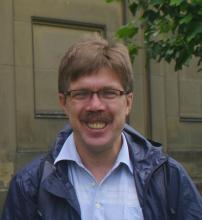Invited plenary speaker: Evgeny Timofeev, a Professor of Computational Fluid Dynamics at McGill University, Canada

Hybrid, explicit-implicit, finite-volume schemes on adaptive unstructured grids for unsteady compressible flows
Explicit schemes are widely used for simulations of unsteady high-speed flows withshock waves. However, in some shock wave flows the time step of explicit time marchingbecomes severely restricted by particular conditions in a relatively small flow area whilethe rest of the computational domain admits much higher time steps. There may bedifferent sources of such temporal stiffness, e.g., small geometrical features; locally hightemperatures and velocities; localized regions where viscous effects are essential. In these cases onemay obviously benefit from a hybrid, explicit-implicit, scheme which would turn into the implicitmode in the flow regions causing temporal stiffness while the rest of the flow would besimulated in the explicit mode. A number of such schemes proposed in the past are outlined in the present talk.
A recently proposed hybridization approach is then introduced and used for the development of hybrid, explicit-implicit, schemes of the second order both in space and time on smooth solutions in both modes. The schemes belong to the class of TVD (Total Variation Diminishing) schemes and, thus, free from spurious oscillations near discontinuities. Space and generalized time TVD limiters are used to ensure the TVD property. The LU-SGS scheme with grid re-ordering is employed to solve the discretized equations on unstructured grids. The development is carried out sequentially for the linear advection, Burgers, Euler and Navier-Stokes equations. Numerous test cases and applied problems are used to illustrate the accuracy and efficiency of the developed algorithms.
About the author
Professor Evgeny Timofeev is presently an Associate Professor at the Department of Mechanical Engineering of McGill University (Montreal, Quebec, Canada). His research interests are related to unsteady high-speed wave phenomena as well as the development of accurate and efficient numerical techniques for such flows. Current activeareas of research include basic studies on essentially unsteady shock interactions and transitions between various types of shock reflection; starting flows in the air intakes of next-generation hypersonic air-breathing engines; shock waves in mixtures of fluids with complex equations of state; and wave phase conjugation phenomena in non-linear acoustics.
Professor Timofeev obtained his PhD degree from St. Petersburg State Technical University (former Leningrad Polytechnical Institute, USSR) and worked at Ioffe Physico-Technical Institute of the Russian Academy of Sciences (St. Petersburg, Russia) and Institute of Fluid Science, Tohoku University (Sendai, Japan) before coming to McGill University in 2003. He also held various visiting positions around the world, e.g.:Institute of Space and Astronautical Science (Japan), Kyoto Institute of Technology (Japan), University of Erlangen-Nurnberg (Germany), University of Lille 1 (France), University of New South Wales at the AustralianDefense Force Academy (Australia). He is known for a number of pioneering results in basic studies on shock wave reflections as well as for challenging applied research projects in Russia, Japan, and Canada. The original and efficient numerical techniques and codes for unsteady inviscid and viscous flows developed by Professor Timofeev with his colleagues and students are used in many countries worldwide (Japan, Canada, Russia, France, Australia). He has more than forty refereed journal papers and book chapters and over ninety refereed conference papers.
Professor Timofeevis is the Editor-in-Chief of Shock Waves International Journal published by Springer. He is an Associate Fellow of AIAA and the member of the International Advisory Committee of the International Symposium on Shock Waves.
Professor Timofeev website can be found under this link
